Voices from CTRLshift 1
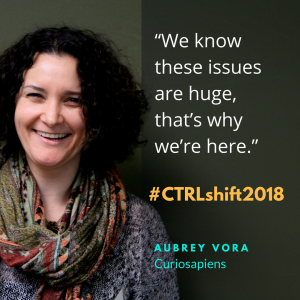
Red Pepper magazine’s latest piece by CTRLshift key collaborator, Jay Tompt, on how we build an effective movement for positive change in Britain.
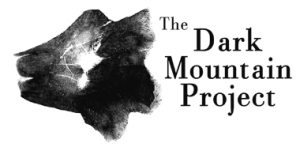 “So Resilience is ‘how do we keep what we really want to keep?’, Relinquishment is ‘what do we need to let go of?’ and Restoration is ‘what can we bring back to help us through this?’”
“So Resilience is ‘how do we keep what we really want to keep?’, Relinquishment is ‘what do we need to let go of?’ and Restoration is ‘what can we bring back to help us through this?’”
Dark Mountain co-founder, Dougald Hine and professor of ‘Deep Adaptation’, Jem Bendell, discuss a fascinating new framework for life in a very different climate.
http://dark-mountain.net/blog/extending-the-glide-an-interview-with-jem-bendell/
![]()
At Ethical Consumer we have observed a worrying trend: governments ceding increasing amounts of power away from people and into the hands of large corporations, whether through privatisation, deregulation or multi-national trade deals. The uncertainty caused by Brexit means that these issues are particularly poignant in the UK today as our Government seeks to find new trade relationships and incentivise big business to stay.
‘Inspired’ by our current political climate, Ethical Consumer focused its 2017 conference on challenging corporate power, which brought a number of different voices into this space: from ethical consumers, alternative media, campaigners, think tanks, policy makers, permaculture practitioners and ethical business. All have a unique and important approach to tackling our current predicament. We must, together, challenge corporate power, especially if our Government’s won’t.
“This country severely lacks the channels for meaningful participation. This is true in both public and private spheres. Participation in politics is crucial for a better and more inclusive society. Participation should not mean several aggressive marketing campaigns followed by a piece of paper with a yes/no question on it. We need to find ways to be inclusive and to collectively support a dialogue between those who have become divided. Our role in civil society should not just be occupy this space but to open it which I hope CTRL Shift can facilitate.” Fran – Ethical Consumer team.
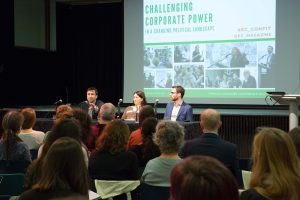
Ethical Consumer conference 2017
At the core of Ethical Consumer is a belief that we, as consumers, as citizens, have power. This is not just referring to individuals’ ability to avoid products which have harmful effects on people, animals and the environment, but the ability to physically resist (fracking companies in our communities for example), or practically create the world we believe in by supporting regenerative initiatives.
Through supporting ethical business and regenerative practice, we believe there is the opportunity to transform the entire culture of consumerism into something that can act positively in the world. There is often an ‘us and them’ mentality held by civil society actors with regards to private enterprise, but businesses have a wide network. They connect their customers, their employees and all those working in their supply chain. It could be just as effective to support the devolving of power within corporations as well as away from them.
Imagine if giving power to a corporation equated to giving equal power to all those connected to it and not just to a small number of wealthy executives.
We are hopeful about the opportunities CTRLshift can bring and look forward to engaging with the multitude of organisations attending. For our part we hope we can bring what we have learnt from nearly 30 years working in this space and the importance of working and collaborating at all levels.

Rob Harrison – co-founder of Ethical Consumer
Rob Harrison, co-founder of Ethical Consumer commented: “CTRLshift seems to throw up a lot of questions for me. Why is it needed now? Is there something unique about this moment? Is there something wrong with our political parties where normally this kind of discussion would take place? Or is there something wrong with the system within which the parties operate? Localism can provide only part of the answer I think. Because there are downsides to localism too – like inequalities in provision and a loss of global connection. At Ethical Consumer we know the importance of making change happen by working at many levels at the same time – on building new institutions (ethical companies) locally while reforming the ones we have globally (boycotts, social labels), at the same time as fighting to regulate all of them.”
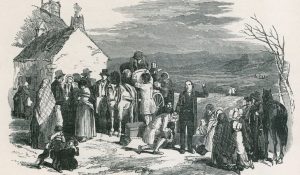 Tackling Social Inequality: Charity and Co-operation?
Tackling Social Inequality: Charity and Co-operation?“We cannot force up the wages of labour, or force down the prices of provisions, without disorganising society” – Sir Charles Trevelyan, 1846
It’s a sad fact that this quote, from the Treasury official responsible for the Government response to starvation during the potato famine in both Ireland and Scotland, seems relevant again today. The problem cited during the potato famine was that to hand out food for free would disrupt the local economy, which had failed in North West Scotland because of the decline in the kelping industry. In the end the response in North West Scotland for most of the famine was not managed by the government but by the Central Board of Management of the Fund for the Relief of the Destitute Inhabitants of the Highlands. This was an amalgamation of independently formed groups from Edinburgh and Glasgow, and was funded a significant charitable donation campaigns.
Indeed the suffering of Victorian labourers led not to any grand reorganisation of society, instead the advent of charity has shaped our approach to social inequality ever since. But whilst charitable benevolence is often seen as the mark of a successful businessman, those forced to ask for help are often stigmatised in our society. So we see that people already demonised for needing benefits, at a time when falling wages do not match the rising cost of living, often face further judgement for requiring food banks. When wages don’t cover the cost of living, benefits are effectively subsidies to employers. In some cases even the welfare state is not sufficient to stop people ending up on the street.

In the recent cold weather the epidemic of homelessness has never seemed so prominent; local authorities are to be applauded for kicking in extra funding to make beds available for free, but even these have in many cases been unavailable to rough sleepers with animal companions and in some cases have even led to charities reporting service users to the immigration authorities.
“The dog has been with me 9 years, I’ve been homeless 6 months. If the dog sleeps outside then I do too.” – Leeds rough sleeper
The ravages of free market liberalism may be showing us their death throws, or they may be reaching a new peak, but it is clear – with wealth inequality spiralling in the UK right now – that fundamentally the overall trend is not toward these problems being solved.
So how should we, as a society, approach inequality? What action can we take?
It could be argued that such sweeping changes are the realm of government, and certainly the recent trend of voter control by fear will need to change. Indeed in the Scottish independence referendum and general election of 2017 that seemed to happen. In Scotland the broadly more positive campaign lead by the SNP gained polling ground from start to finish. In GE2017 Labour’s offering of a message of positive change seemed to overcome the narrative that austerity was necessary.
It is also abundantly clear, however, that building positive relationships in communities can have a huge impact. From the success of the transition town movement, through the growing engagement with the anti waste movement led by the real junk food project, to the resistance to fracking and increased union membership it is clear that more and more people are choosing to stand together and take action to improve the world around them.
This was written during the largest industrial action that UK universities have ever seen, in opposition to changes to the USS pension scheme, which at the time of writing is showing signs of success. There have also been numerous stories in recent years of employees working under precarious conditions (the so called “gig economy”) unionising and fighting for better conditions at work. So standing together, putting all of our feet down and saying enough is enough can really change things. This is also evident in the very low take up of fracking in the UK. In Scotland fracking is banned (though this is now being legally challenged). The failure of fracking elsewhere; despite many years of support from central conservative led government; has been put down largely to the extra expense in security and legal action which is forced by public resistance.
Meanwhile communities are coming together voluntarily to improve their environment and wellbeing. By producing food locally, managing land to reduce flood risk, redistributing unsold food and so on and so on, people improve their access to the necessities of life, in terms of food security, disaster mitigation whilst building valuable social support networks.
These are not acts of charity, but of community. This is not about rich helping poor, but everyone working together. This is not about government abdicating responsibility, but people choosing to stand up and help each other. Giving money can often be a way of avoiding our feelings of guilt, whereas increasingly people are using these negative emotions as motivator for positive change. Community voluntary action is taking the place of charitable donation as people increasingly allow themselves to respond emotionally to social inequality when they see it around them.
Written by:
Dr Sandy James is a researcher and UCU member at the University of Leeds, Chairs the Board of Trustees of the Permaculture Association (Britain) and is an active volunteer in a number of organisations in West Yorkshire.
Ruth L. Quinn is a doctoral candidate at the University of Hull researching the significance of rural landscapes at planned settlements and a museum professional interested in heritage as a vehicle for social change.
 Meal & Social Evening
Meal & Social Evening7pm-10.30pm | The Old Court Rooms | Wigan Town Centre |
Fur Clemt, a local waste food project, are providing a vegetarian buffet with vegan options. There will be lots of choice and to ensure this, the usual food surplus donations will be supplemented by bought in ingredients. It will be set out as a serve yourself buffet with allergens and vegan options clearly labelled for each dish.
There will be live music and poetic performance from a range of artists. Full details below.
All of this will happen at the atmospheric Old Court Rooms, a social enterprise venue 15 minutes from The Edge Conference Centre.
Tickets are separately for this via the Permaculture Association booking system at a price of £15 including food. Click here to book.
https://wigandiggersfestival.org
Laura Taylor:
Laura Taylor is a seasoned performance poet and compère, with many festivals, gigs and fundraisers under her belt. She stood as a Green Party councillor for the Rainhill Ward local elections in 2015, and is a committed socialist. Her debut poetry collection, Kaleidoscope, was published in 2016 by Flapjack Press, with a foreword by Attila the Stockbroker, who describes her as “riveting, inspiring, dead hard and incredibly soft at the same time”. Her second collection, Fault Lines, is due out in the summer of 2018.
Write Out Loud Profile: https://www.writeoutloud.net/profiles/laurataylor
Bob Kettle
A renowned singer-songwriter in his own right, Bob is also one of the creative forces behind the folk-rock band Merry Hell, contributing some of their finest songs and adding his unique persona to their stage presence.
His solo performances present his work in its rawest form: just a man with his guitar, harmonica and words – his poetically lyrical songs speak truth to power and express his deeply held beliefs about justice, equality, community and the environment.
His song ‘Come On, England!’ was recently judged the winner of the prestigious FATEA magazine award for Best Single of 2017.
www.merryhell.co.uk
Bard Company:
The North’s answer to the Young Ones! – In yer face poetry, music and comedy with a socialist edge from the oldest boy band on the circuit! The ‘Old Ones’ have performed to many audiences across the North, go and see them at your peril!
Having released their first album ‘All Systems Go!’ and with a a mixture of music, comedy and poetry Bard Company are supporting causes that matter with gigs at The Diggers Festival, Bolton Socialist Club, and Wakefield’s Red Shed – high passion and hard hitting words, Bard Company say it as it is
http://whiteleyian.wixsite.com/bard-company
Virginia Kettle and the Dreamkeepers
Already a well-respected solo singer-songwriter in her own right, with two albums under her belt,
Virginia leads, both vocally and creatively. Having contributed some of the most distinctive songs to all four Merry Hell albums to date, Virginia is embarking on producing and playing her songs in their rawest form, with accompaniment from some of her fellow dream keeping musicians.
Her concerts are a more intimate affair, allowing her to share her insights into and observations of personal relationships, as well as her keen interest in envionmental affairs. Audiences at both her solo and band appearances will enjoy her anthemic, joyful, jolly, ecologically friendly song about death ‘Bury Me Naked’.
http://vkandthedreamkeepers.com/
What are the existential threats facing Britain? What opportunities can come from Brexit? Why is the CTRLshift summit crucial? Andy Goldring, of the Permaculture Association explains.
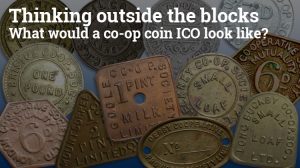 An article from one of our CTRLshift partners, The Open Coop.
An article from one of our CTRLshift partners, The Open Coop.
Co-op coins are not a new concept but the days of trading locally minted coins for a pint of milk or a loaf of bread are long gone. Instead, the rising interest in digital currencies and rapid increase in the number of Initial Coin Offerings looks set to make 2018 “the year of the crypto currency”.
Read full article here: https://open.coop/2018/01/25/co-op-coin-ico-look-like/
 Colin Tudge, co-founder of the Campaign for Real Farming and the Oxford Real farming Conference writes about the damaging status quo Britain finds itself in, the need to transfer control from oligarchy to community, and his hopes for ‘a historic meeting’ at the CTRLshift summit.
Colin Tudge, co-founder of the Campaign for Real Farming and the Oxford Real farming Conference writes about the damaging status quo Britain finds itself in, the need to transfer control from oligarchy to community, and his hopes for ‘a historic meeting’ at the CTRLshift summit.
First published by Colin Tudge here
In Britain, these days, all the essential endeavours that are supposed to promote general wellbeing and what is known as “civilization” are, it is widely agreed, in crisis: the health and social services; housing; education; energy; transport; and of course, though successive governments haven’t taken it seriously, agriculture. Oh yes, and then there’s “the environment” – nothing less than the biosphere; nature; the living world — but commonly thought of these days as real estate or “natural capital” whose job is to provide “ecosystem services”. A third of our native species are in imminent danger of extinction although that, surely, is a very conservative estimate.
Britain is not the worst country in the world. Not by any means. It is, however, the world’s fifth largest economy with all the trappings of riches beyond dreams – all that OTT architecture and those countless coffee bars in the city of London – and so we have less excuse than most. But all that successive governments from all the major parties have offered these past 40 years is more of the same: the same technophilic, mechanistic mindset; the same obsessive pursuit of ever-increasing, quantifiable wealth, without apparent regard to how it’s produced, or what it is used for, or who finishes up with it. It would be good to report that the various religions, as guardians of morality and probity (aren’t they?) are making a difference and pointing the way forward and so, to be fair, they sometimes do. But all are riven by internecine strife and endless, quasi-theological debates that seem to belong to past ages that in some ways were even darker than the present; and in net, alas, their contribution the world over is highly equivocal.
Beyond doubt, billions worldwide are seriously discontented. A survey of Americans in the 1990s showed that most of them wanted their country and the world to be different – less materialistic; focused far more on human values – though most, it turned out, believed that their fellow citizens remained fixated on wealth and “economic growth” and that nothing therefore could be changed. Many millions, though, worldwide, in hundreds of thousands of communities and movements – societies, NGOs, informal gatherings – are trying to change things around, on all fronts; with new ideas and, more to the point, with action: different ways of organizing our lives; different ways of doing things. The tremendous weight, momentum, and general inertia of the status quo is against them – law, bureaucracy, corporate power, and of course successive governments – but the mavericks keep trying and sometimes, to some extent, they succeed.
What’s lacking, though, is coordination; and crucial to this, I suggest, is a coherent philosophy. At present, different groups that in reality want the same things and to a significant extent agree on what should be done nonetheless dress their ambitions in different words and pursue their own agenda. Our own College for Real Farming and Food Culture is intended to provide the essential, coherent philosophy that’s missing.
Above all, though, we need concerted action. Perhaps most obviously, small farmers need to work together more than they do so that they can market their produce more effectively – and, ideally, coordinate management to some extent so that although each enterprise remains small, together they can operate on a landscape scale. Farmers, growers, and whole communities, rural and urban, need to work more closely together too. Farming, healthcare, social care, education, transport, housing, conservation – all feed into each other and all need to coordinate their efforts far more than they do.
It’s clear, though, for a whole list of reasons, that we cannot afford to leave our affairs and the fate of the world to governments, or rather these days to the oligarchy of governments, corporates, and financiers, supported by compliant academics and other intellectuals. The oligarchy operates de haute en bas and although some of its members are well-meaning their net effect is to perpetuate the hierarchy and the status quo. We, people at large, must take control. The world’s affairs must in practice be organized at all levels from the individual to the United Nations – but, many suggest, the prime focus of action and of change must be the community. Communities can be democratic, as larger gatherings cannot; and they can be effective, as most individuals (all but the obscenely rich) cannot. In short: control should not come from the top down, but neither can it come from the bottom rung of all. It must come from near the bottom. The community must be the epicentre of power.
Some of those who feel this way, gathered together under the name of CTRLshift, are convening in Wigan on March 27-29 to see what they can do to push things forward and get the world moving on a different tack. It could and should be an historic meeting. To some extent the endeavour is linked to Brexit, which some feel offers an opportunity for Britain to start again on a fresh and more agreeable footing – though a great many people including me regret our departure in the same way that Matthew Arnold, a century and a half ago, regretted the passing of religious faith:
“ … now I only hear its melancholy, long, withdrawing roar, retreating, to the breath of the night-wind, down the vast edges drear and naked shingles of the world”.
Why meet in Wigan – and why the end of March? Because, the CTRLshift organizers say, Wiganers voted emphatically to leave the EU; March 29 is the anniversary of the signing of Article 50 of the Lisbon Treaty, which began the formal process of withdrawal; and 2018 is close to the 80th anniversary of George Orwell’s The Road to Wigan Pier. I’m told that Wigan has brightened up a lot since Orwell described “the monstrous scenery of slag-heaps, chimneys, piled scrap-iron, foul canals, paths of cindery mud criss-crossed by the prints of clogs”. These days it’s nice.
Partners in this initial meeting include The Alternative UK; Co-ops UK; Forum for the Future; People’s Food Policy; Shared Assets; Permaculture Association; Solidarity Economy Association; Social Enterprise UK; Stir Magazine; Unltd; Totnes REconomy project; Transition Network; Shared Future CIC; Coop Business Consultants; The Low Impact Living Initiative; Counter Coin; Quantum Communications; and indeed the Real Farming Trust, of which the Campaign for Real Farming (including this website), the College for Real Farming and Food Culture, and the Oxford Real Farming Conference are projects. Indeed, there’s a lot going on.
Further information from http://ctrlshift.org.uk

What might the ‘next system’ look like? John Restakis argues for the Cooperative Commonwealth & Partner State, published by CTRL-Shift Summit 2018 co-convening partner, The Next System Project.
https://thenextsystem.org/cooperative-commonwealth-partner-state